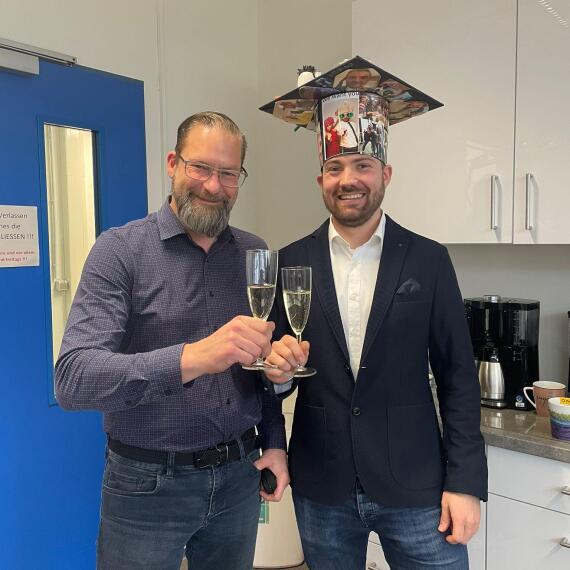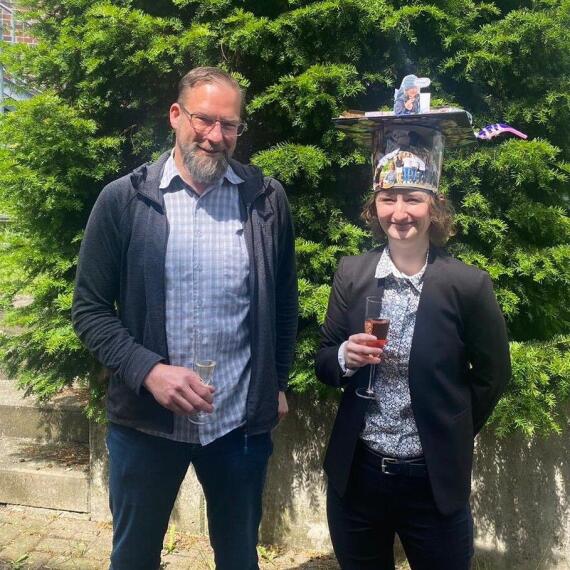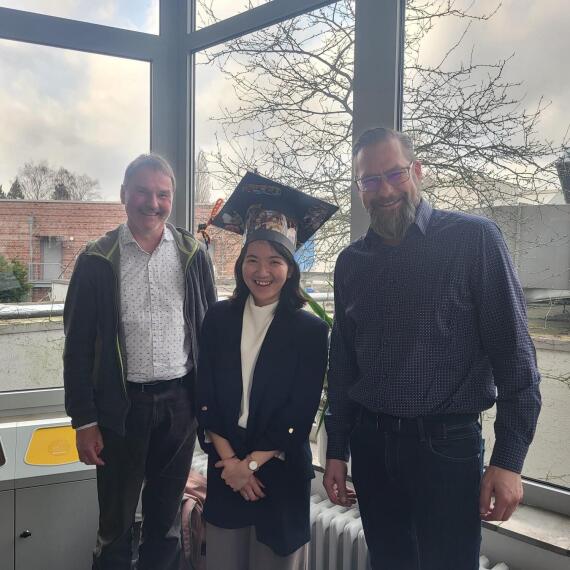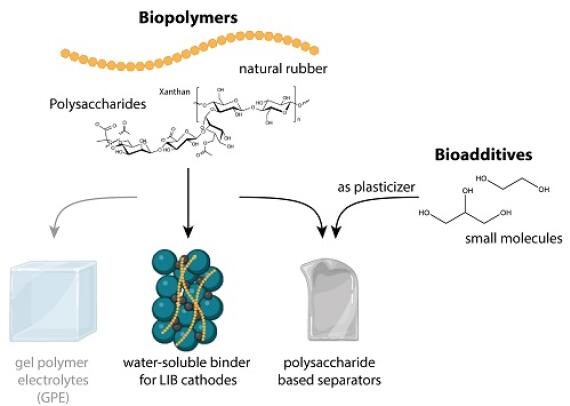



Dr. Giulia Ravagnan!
Manuscript published: "Promising non-model microbial cell factories obtained by genome reduction"
Today, the article by Ravagnan & Schmid was published in Frontiers in bioengineering and biotechnology.
This review article gives an overview of various genome reduction approaches in non-model prokaryotic microorganisms and it highlights examples of successful genome-reduced model organism chassis. Congratulations to Giulia Ravagnan for the outstanding work done and your third publication.
Manuscript published: "Implementation of Spore Display in Paenibacillus polymyxa with Different Hydrolytic Enzymes"
Today, the article by Zander et al. was published in MDPI in Microorganisms.
This research article demonstrates the implementation of the spore display method in Paenibacillus polymyxa and it explores a possible new technique for the purification of the enzymes with the TEV cleavage site between the anchor and the protein of interest. Congratulations to Maximilian Zander for the outstanding work done and your first publication.

Dr. Julia Schilling!
Manuscript published: "Comprehensive rheological analysis of structurally related acetan-like heteroexopolysaccharides from two Kozakia baliensis strains in surfactants and galactomannan blends"
Today the article by Schilling et al. was published in New Biotechnology.
This manuscript describes a comprehensive rheological analysis of the exopolysaccharides (EPS) derived from two Kozakia baliensis strains in selected surfactant commonly used in personal care applications. The native, non-decorated EPS derived from K. baliensis LMG 27018 showed significant potential as a salt-independent rheological modifier compared to a genetically engineered xanthan variant without decorations. These makes the GMO-free EPS of K. baliensis very attractive for food and cosmetics, further extending the portfolio of bio-based rheological modifiers. Congratulations to Julia Schilling for her outstanding work.
Manuscript published: “Genome reduction in Paenibacillus polymyxa DSM 365 for chassis development”
Today the article by Ravagnan et al. was published in Frontiers in bioengineering and biotechnology.
This manuscript describes the first complete genome sequence in Paenibacillus polymyxa DSM 365 in which we have identified a new non-ribosomal peptide synthase (NRPS) that may contribute to the production of the interesting antimicrobial peptide tridecaptin. Furthermore, we have constructed for the first time two genome-reduced P. polymyxa strains, with a decreased native genome of 3.0 % and 0.6 %, which show a great potential for further genetic engineering. Congratulations to Giulia Ravagnan for her outstanding work and her first publication. Special thanks also for the great collaborations with Prof. Dr. Johannes Kabisch, Prof. Dr.-Ing. Stephan Noack and Prof. Dr. Rolf Daniel.
Manuscript published: “Engineering the carbon and redox metabolism of Paenibacillus polymyxa for efficient isobutanol production”
Today the article by Meliawati et al. was published in Microbial Biotechnology.
For the first time, we implemented a heterologous pathway in Paenibacillus polymyxa, aiming for production of isobutanol. We integrated rational metabolic engineering with proteomics analysis and in vitro assays for a better understanding of its metabolism and pathway optimization. By that, we were able to produce that synthetic compound for the first time in P. polymyxa in already good amounts and were able to identify metabolic bottlenecks. Congratulations to Meliawati for her outstanding work and thanks also for the great collaboration with Dr. Daniel Volke and Prof. Dr. Ivan Nikel.

Dr. Meliawati!

Biostore
Manuscript published: "Acetan-like heteropolysaccharide production by various Kozakia baliensis strains: Characterization and further insights"
26 September 2023
Today, the article by Wünsche et al. was published in the International Journal of Biological Macromolecules.
This article describes the detailed chracterisation of different Kozakia baliensis strains and the exopolysaccharides they form. Due to the similarity of the basic structure to xanthan (different side chains, and no substituents), we compared the exopolysaccharides with a genetically modified xanthan variant. What is particularly exciting is that the exopolysaccharides formed differ in their chemical structure, and we were able to reconcile these structural differences with the rheological behaviour. A further step towards a systematic understanding of the structure-function relationship of polysaccharides.
Congratulations to Julia Wünsche for the outstanding work done and your second publication.
Manuscript published: "Rheological characterization of artificial Paenan compositions produced by Paenibacillus polymyxa DSM 365"
29 July 2023
Today the article by Schillinget al. was published in the journal Carbohydrate Polymers.
This publication describes the rheological properties of the 3 different exopolysaccharides (Paen I, II and III) that we have produced in pure form for the first time. The main focus is on the interactions of the individual polymers. With this work we have shown how synthetic biology can be used to elucidate structure-function relationships in the field of rheology. Congratulations to Christoph Schilling for his outstanding work and the third publication on the topic of paenan exopolysaccharides.
Manuscript published: "Acetobacteraceae as exopolysaccharide producers: Current state of knowledge and further perspectives"
Today, the article by Wünsche et al. was published in the journal Frontiers in Bioengineering and Biotechnology.
This review article gives an overview of the different exopolysaccharides produced by acetic acid bacteria, and was published in the Special Issue of the International Symposium on Biopolymers, where Julia also gave a talk. With this paper we have summarised the current research in this field and thus convey the state of the art in this area. Congratulations to Julia Wünsche for her outstanding work and her first publication.
Manuscript published: ""CRISPR-Cas9 driven structural elucidation of the heteroexopolysaccharides from Paenibacillus polymyxa DSM 365"
20 February 2023
Today the article by Schilling et al. was published in the journal Carbohydrate Polymers.
This manuscript shows how successfully our CRISPR-Cas tool for Paenibacillus polymyxa can be used for the structural elucidation of unknown and highly complex microbial polysaccharides. With this work we have shown for the first time that P. polymyxa is able to produce three different heteropolysaccharides, whereas it was previously assumed that only one polysaccharide was involved. This was only possible due to the excellent cooperation with Prof. Finn Lillelund Aachmann from NTNU in Tondheim.
This is another step towards a better understanding of polysaccharide biosynthesis in Paenibacillus polymyxa. Congratulations to Christoph Schilling and Leesa Klau for their outstanding work.

Grand Jamboree

WWU-iGEM Team 2022
Congratulations!
Wiki Freeze was on 12.10.2022 at 6pm and the team successfully uploaded and submitted everything. Now the final presentation at the Grand Jamboree in Paris is pending. We keep our fingers crossed for a successful review of our project MonChassis. The link to the really excellent wiki is here.
Chapter "Hyaluronic Acid (Hyaluronan)" published in the book "Microbial Production of High-Value Products
06.09.2022
Today the chapter Hyaluronic Acid (Hyaluronan) was published in the book "Microbial Production of High-Value Products" edited by Bernd Rehm and David Wibowo. In this chapter we describe the properties and applications of hyaluronic acid. We also show the different production methods of this very valuable polysaccharide and compare the classical production from animal sources with the microbiological production. Congratulations to Meliawati Meliawati and Moritz Gansbiller for the excellent research and work that went into this book chapter.
Manuscript published: "Insights in the Complex DegU, DegS, and Spo0A Regulation System of Paenibacillus polymyxa by CRISPR-Cas9-Based Targeted Point Mutations"
19th of May 2022
Today, the article by Meliawati et al. was published in the Journal Applied and Environmental Microbiology.
In this manuscript, we have again further developed our existing CRISPR-Cas tool for Paenibacillus polymyxa. With this further development, it is now possible to introduce targeted point mutations into specific target genes. Using these point mutations, we have for the first time investigated the complex regulation by DegS, DegU and Spo0A by analyzing the mutants for swarming behavior, sporulation and exopolysaccharide production as well as expression of hyfrolyzing enzymes. This is a first step towards a better understanding of the overall regulation in Paenibacillus polymyxa. Congratulations to Meliawati Meliawati for the outstanding work done.
16nd of December 2021
Manuscript published: "CRISPR-Cas9-mediated Large Cluster Deletion and Multiplex Genome Editing in Paenibacillus polymyxa"
Today the article by Meliawati et al. was published in ACS synthetic Biology. In this manuscript, we have further developed our existing CRISPR-Cas tool for P. polymyxa. With this further development, entire gene clusters can now be deleted using only one gRNA, and we were able to demonstrate for the first time a systematic approach in the selection criteria required for the localization of the gRNA. Furthermore, this system now allows multiple gene knock-outs, gene replacements, as well as multiple deletions of whole gene clusters and the simultaneous replacement of gene clusters with reporter genes with an impressive efficiency. This opens up completely new possibilities for genome editing in P. polymyxa. Congratulations to Meliawati Meliawati for the outstanding work done.
2nd of December 2021
Manuscript published: "Structural elucidation of the fucose containing polysaccharides of Paenibacillus polymyxa DSM 365."
Today the article by Schilling et al. was published in Carbohydrate Polymers. In this manuscript, we identified the chemical structure of one of the polysaccharides of P. polymyxa using CRISPR-Cas9 based gene knock-outs. Here we show how well synthetic biology can be combined with structural analysis of polysaccharides, and how in vivo biopolymer engineering can be used in different ways. Congratulations to Christoph Schilling for the great work done.
17th of September 2021
Joint working group on synthetic biology
Synthetic biology encompasses various disciplines in the natural and life sciences and includes the design of biological networks, systems or even entire cells that do not occur in nature.
In January 2020, the DECHEMA and the Society for Biochemistry and Molecular Biology (GBM) agreed to merge the activities of the Division for Systems Biology and Synthetic biology and the GBM study group Synthetic biology in the Joint Synthetic Biology Working Group. In February 2021, the German Chemical Society (GDCh) joined the agreement; The German Botanical Society (DBG) was added in June 2021.
On September 17th, during the German Conference on Synthetic Biology 2021, the general assembly elected the steering committee 2021-24.
2nd of September 2021
Paper accepted: "Exploiting unconventional prokaryotic hosts for industrial biotechnology"
Today the opinion article by Prof. Schmid and colleagues was accepted in Trends in Biotechnology. In this manuscript the potential of unconventional host is depicted and compared to established model prokaryotic organims. One of these is Paenibacillus polymyxa, by others the main work horses of the AG Schmid with a very high potential for biotechnological applications. In this opinion article main factors such as multi-factorial traits like tolerance, growth efficiency, or handling which cannot always be engineered into existing model organisms are highlighted. We hope you enjoy the article and are looking forward to the feedback of the scientific community.


